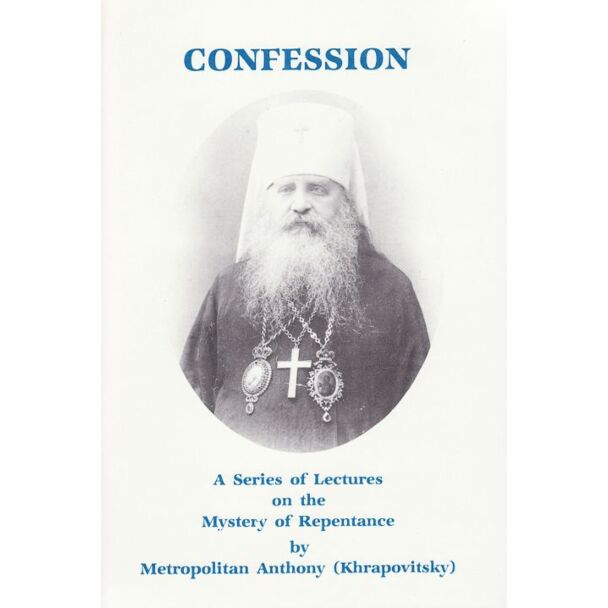Confession: A Series of Lectures on the Mystery of Repentance
by Metropolitan Anthony (Khrapovitsky)
Translated from Russian by Fr. Christopher Birchall
Translated from Russian by Fr. Christopher Birchall
Publication Data: Jordanville, NY: Holy Trinity Monastery, 1996
Format: softcover
Number of Pages: 112
Dimensions (l × w × h): 22.9 cm × 15.3 cm × 0.6 cm
Additional Information: black-and-white illustrations
ISBN: 0‒00465‒005‒7
by Metropolitan Anthony (Khrapovitsky)
Translated from Russian by Fr. Christopher Birchall
“The present work, Confession, is based on the lectures Vladika Antony gave during his courses on pastoral theology, but it was actually written down in 1920, while he was temporarily confined in a Uniate monastery in western Russia, due to the circumstances of the Civil War. It is primarily a manual for priests, written to show them how to give spiritual advice and help during confession, and gives great insight into the various ways in which the passions afflict the human soul. It is precisely this struggle, and, with the help of God’s grace, gradual victory, which is, in the view of Vladika Antony, the feature distinguishing Orthodoxy from all other religions—the very essence of Orthodoxy[...]. Although it is addressed to priests, it is obviously of great value to all Orthodox Christians, who are engaged in this struggle (with the exception of chapters 2-5).”
—“TRANSLATOR’S INTRODUCTION”
CONTENTS
Chapter 1. The Significance of Confession for Christians.
How this work came to be written. Priest should always speak as if at confession. Great power for good in priests’ hands. Scandalous conditions of confession in Russia. People quite different at confession than at other times. Priest must acquire spiritual experience to be able to give spiritual help.
Chapter 2. The Spiritual Father’s Own Disposition.
Stop and think what confession is. Remember your own falls and your words will be full of compassion. Compassionate love — the essence of the grace of the priesthood. Spiritual therapy is far more important than priest’s other tasks. Joy over newly-born spiritual child.
Chapter 3. The Influence of Confession.
Show sincere love and you will change a man’s life. If you cannot always be like this, repent before God but do not despair of being a true spiritual father. Struggle to acquire compassion.
Chapter 4. The Outward Arrangement of Confession.
Try to arrange so 500 do not come on one day (as in pre-revolutionary Russia). Sermon before confession (quote canons). Reading of homily to those waiting. Two prayers of absolution. Rule of prayer before Communion.
Chapter 5. Spiritual Direction
Once love is shown, concrete advice expected. First priest must work on own soul; also observe others with love. Read: Bible, Synaxarion, Philokalia, etc. Become absorbed in spiritual therapy — reading and own experience will work together.
Chapter 6. Spiritual Healing. Unbelief and Weak Faith.
Unbelief the most serious malady. Philosophy only excuse because faith enjoins chastity. If one comes to confession, already is struggling with unbelief. Sudden conversion rather than gradual conviction. Doubts about particular teachings: Communion, devil, fasting, miracles. These are less serious, often explained in Gospel.
Chapter 7. Imaginary Doubts.
Involuntary doubts and blasphemous thoughts not a sin and to be ignored.
Chapter 8. Fear of Admitting a Sin.
“Is there some sin you cannot bring yourself to confess?” Sometimes very shameful sins concealed many years. Essential to show great love and sympathy: you are on sinner’s side. Penance must be assigned intelligently. Despondency and despair to be feared here — spring from self-love.
Chapter 9. Self-justification.
Opposite of despair — just as stubborn. No real pangs of conscience for adultery, etc. Hence deeper fall into sin and crimes. Sense of sin, rather than great virtue distinguishing trait of those being saved. When offended, always consider how you were at fault. You have not committed grave sins, but have not been severely tempted. St. Ephraim the Syrian and many others wept constantly over their sins.
Chapter 10. Spiritual Delusion (Prelest)
Snare of those who are religious. Imagining one “chosen of God.” Mass prelest in Russian society. False prophets. Diagnosing prelest and khlystism at confession: sign of cross as test for visions, solemn cursing of khlyst errors demanded from suspected khlyst.
Chapter 11. Sicknesses of the Will and Heart. Anger.
Spiritual ills of those within the Church. Concentrate on 8 passions at root of sin rather than manifestations of them. How to struggle: half battle to recognize passion. Prayer. Anger. Try making friendly approach: how to act if unsuccessful. Meekly ask forgiveness: bitter out of pride. Beauty of freedom from anger. Those bearing grudges not to commune. Athonite custom.
Chapter 12. Pride and Vainglory.
Anger indicator of other passions. Material for sermons as well as confession. Ideas of “noble self-love”, “rightful pride”, etc. Vainglory most obvious and amusing form of pride. Mistake of refusing to do good works, etc. “out of humility”: when serving, must carefully reject what comes from pride and cultivate what is sincerely motivated. Real pride — does not seek human praise. Remember your sins, and that all good things given by Creator.
Chapter 13. The Seventh Commandment.
Most frequent of sins — all mankind so tempted. Obtaining admission of guilt, especially from children and adolescents. Ensuring they know it is wrong and helping them out of bad habits. Terrible consequences even in this life. Hatred of sin when in good frame of mind. Avoiding “first step of sin”, self-deception: “I will not go very far.” Positive side: occupy energies of soul with good work. Chance to inculcate habit of prayer. Students and youth: loss of chastity hand in hand with loss of faith which condemns unchastity. Cause of hooliganism and militant atheism. Strong sexual urges from realm of soul rather than body: sex not essential need. Evil of sexual license: to prostitutes, illegitimate children, spouse. Corrupting influence on children, on own soul. Delusion of “romantic love” as irresistable force. Cutting off illicit “affair”. Uncanonicity of mixed marriages within prohibited degrees.
Chapter 14. Drunkenness.
Sister of debauchery. Often caused by passions inexpressible when sober hidden in soul. Change of life and heavy, humiliating work needed if otherwise unconquerable.
Chapter 15. Despondency.
a). Penitent must see he is spiritually sick, and value his soul and salvation above all. Aim of book to open priests’ eyes to spiritual realm, not cover all contingencies. b). Despondency — loss of joy over God’s providence. More usual among those already struggling for salvation. May be due either to forgotten sin or unnoticed, incipient passion, or to depression: a psycho-physical disorder. Usually firm sympathy enough with latter, perhaps rest and pilgrimage. Sin of rejecting divine consolation in tragedy. Despondency — withering of soul: compassion from healthy soul often pours joy back into withered.
Chapter 16. Envy.
Due to some other passionate desire. We are envious when another gets what we want. Complaints of “injustice” often due to envy. Shamefulness of opinions of others based on political party. See all possible good in rival.
Chapter 17. Love of Money.
Difficult for priest to understand. Strange gods. Not passionate outburst, but calmly and consiously held attitude. Riches only acquired through heartlessness and callousness. Love of money often combined with outward piety — self-deception. Difficult to distinguish proper keeping of wealth from passionate avarice. Begin by questioning about dishonest practices. Joy of helping others. Passions of sloth, gluttony and idle-talk not treated here.
Chapter 18. Particular (Individual) Sins.
Sources containing lists of sins. Those who postpone struggle with sin. Those who approach confession without bitter reproaches of conscience.
Chapter 19. Sins Against One’s Neighbour.
Insulting parents. Order of questions likely to awaken conscience. Tempting others to sin. Gloating over others’ misfortunes and remembering wrongs stem from judging others. Be obedient like Savior; do not follow crowd.
Chapter 20. Sins Against God.
Religious life essential to aviod sin. Sins directly against God. Blasphemy. Unfulfilled vows. False oaths. Swearing. Not attending church. Not praying at home. Without prayer no love of God. Superstition.
Chapter 21. Penances.
Penances must not be ignored, but may be softened in view of low contemporary spiritual level.
Appendix A. Extracts from the Order of Confession.
Appendix B. Also from the Order of Confession.
Appendix C. Brief Confession before a Spiritual Father.
Appendix D. Questions for Penitents.
Format: softcover
Number of Pages: 112
Dimensions (l × w × h): 22.9 cm × 15.3 cm × 0.6 cm
Additional Information: black-and-white illustrations
ISBN: 0‒00465‒005‒7
by Metropolitan Anthony (Khrapovitsky)
Translated from Russian by Fr. Christopher Birchall
“The present work, Confession, is based on the lectures Vladika Antony gave during his courses on pastoral theology, but it was actually written down in 1920, while he was temporarily confined in a Uniate monastery in western Russia, due to the circumstances of the Civil War. It is primarily a manual for priests, written to show them how to give spiritual advice and help during confession, and gives great insight into the various ways in which the passions afflict the human soul. It is precisely this struggle, and, with the help of God’s grace, gradual victory, which is, in the view of Vladika Antony, the feature distinguishing Orthodoxy from all other religions—the very essence of Orthodoxy[...]. Although it is addressed to priests, it is obviously of great value to all Orthodox Christians, who are engaged in this struggle (with the exception of chapters 2-5).”
—“TRANSLATOR’S INTRODUCTION”
CONTENTS
Chapter 1. The Significance of Confession for Christians.
How this work came to be written. Priest should always speak as if at confession. Great power for good in priests’ hands. Scandalous conditions of confession in Russia. People quite different at confession than at other times. Priest must acquire spiritual experience to be able to give spiritual help.
Chapter 2. The Spiritual Father’s Own Disposition.
Stop and think what confession is. Remember your own falls and your words will be full of compassion. Compassionate love — the essence of the grace of the priesthood. Spiritual therapy is far more important than priest’s other tasks. Joy over newly-born spiritual child.
Chapter 3. The Influence of Confession.
Show sincere love and you will change a man’s life. If you cannot always be like this, repent before God but do not despair of being a true spiritual father. Struggle to acquire compassion.
Chapter 4. The Outward Arrangement of Confession.
Try to arrange so 500 do not come on one day (as in pre-revolutionary Russia). Sermon before confession (quote canons). Reading of homily to those waiting. Two prayers of absolution. Rule of prayer before Communion.
Chapter 5. Spiritual Direction
Once love is shown, concrete advice expected. First priest must work on own soul; also observe others with love. Read: Bible, Synaxarion, Philokalia, etc. Become absorbed in spiritual therapy — reading and own experience will work together.
Chapter 6. Spiritual Healing. Unbelief and Weak Faith.
Unbelief the most serious malady. Philosophy only excuse because faith enjoins chastity. If one comes to confession, already is struggling with unbelief. Sudden conversion rather than gradual conviction. Doubts about particular teachings: Communion, devil, fasting, miracles. These are less serious, often explained in Gospel.
Chapter 7. Imaginary Doubts.
Involuntary doubts and blasphemous thoughts not a sin and to be ignored.
Chapter 8. Fear of Admitting a Sin.
“Is there some sin you cannot bring yourself to confess?” Sometimes very shameful sins concealed many years. Essential to show great love and sympathy: you are on sinner’s side. Penance must be assigned intelligently. Despondency and despair to be feared here — spring from self-love.
Chapter 9. Self-justification.
Opposite of despair — just as stubborn. No real pangs of conscience for adultery, etc. Hence deeper fall into sin and crimes. Sense of sin, rather than great virtue distinguishing trait of those being saved. When offended, always consider how you were at fault. You have not committed grave sins, but have not been severely tempted. St. Ephraim the Syrian and many others wept constantly over their sins.
Chapter 10. Spiritual Delusion (Prelest)
Snare of those who are religious. Imagining one “chosen of God.” Mass prelest in Russian society. False prophets. Diagnosing prelest and khlystism at confession: sign of cross as test for visions, solemn cursing of khlyst errors demanded from suspected khlyst.
Chapter 11. Sicknesses of the Will and Heart. Anger.
Spiritual ills of those within the Church. Concentrate on 8 passions at root of sin rather than manifestations of them. How to struggle: half battle to recognize passion. Prayer. Anger. Try making friendly approach: how to act if unsuccessful. Meekly ask forgiveness: bitter out of pride. Beauty of freedom from anger. Those bearing grudges not to commune. Athonite custom.
Chapter 12. Pride and Vainglory.
Anger indicator of other passions. Material for sermons as well as confession. Ideas of “noble self-love”, “rightful pride”, etc. Vainglory most obvious and amusing form of pride. Mistake of refusing to do good works, etc. “out of humility”: when serving, must carefully reject what comes from pride and cultivate what is sincerely motivated. Real pride — does not seek human praise. Remember your sins, and that all good things given by Creator.
Chapter 13. The Seventh Commandment.
Most frequent of sins — all mankind so tempted. Obtaining admission of guilt, especially from children and adolescents. Ensuring they know it is wrong and helping them out of bad habits. Terrible consequences even in this life. Hatred of sin when in good frame of mind. Avoiding “first step of sin”, self-deception: “I will not go very far.” Positive side: occupy energies of soul with good work. Chance to inculcate habit of prayer. Students and youth: loss of chastity hand in hand with loss of faith which condemns unchastity. Cause of hooliganism and militant atheism. Strong sexual urges from realm of soul rather than body: sex not essential need. Evil of sexual license: to prostitutes, illegitimate children, spouse. Corrupting influence on children, on own soul. Delusion of “romantic love” as irresistable force. Cutting off illicit “affair”. Uncanonicity of mixed marriages within prohibited degrees.
Chapter 14. Drunkenness.
Sister of debauchery. Often caused by passions inexpressible when sober hidden in soul. Change of life and heavy, humiliating work needed if otherwise unconquerable.
Chapter 15. Despondency.
a). Penitent must see he is spiritually sick, and value his soul and salvation above all. Aim of book to open priests’ eyes to spiritual realm, not cover all contingencies. b). Despondency — loss of joy over God’s providence. More usual among those already struggling for salvation. May be due either to forgotten sin or unnoticed, incipient passion, or to depression: a psycho-physical disorder. Usually firm sympathy enough with latter, perhaps rest and pilgrimage. Sin of rejecting divine consolation in tragedy. Despondency — withering of soul: compassion from healthy soul often pours joy back into withered.
Chapter 16. Envy.
Due to some other passionate desire. We are envious when another gets what we want. Complaints of “injustice” often due to envy. Shamefulness of opinions of others based on political party. See all possible good in rival.
Chapter 17. Love of Money.
Difficult for priest to understand. Strange gods. Not passionate outburst, but calmly and consiously held attitude. Riches only acquired through heartlessness and callousness. Love of money often combined with outward piety — self-deception. Difficult to distinguish proper keeping of wealth from passionate avarice. Begin by questioning about dishonest practices. Joy of helping others. Passions of sloth, gluttony and idle-talk not treated here.
Chapter 18. Particular (Individual) Sins.
Sources containing lists of sins. Those who postpone struggle with sin. Those who approach confession without bitter reproaches of conscience.
Chapter 19. Sins Against One’s Neighbour.
Insulting parents. Order of questions likely to awaken conscience. Tempting others to sin. Gloating over others’ misfortunes and remembering wrongs stem from judging others. Be obedient like Savior; do not follow crowd.
Chapter 20. Sins Against God.
Religious life essential to aviod sin. Sins directly against God. Blasphemy. Unfulfilled vows. False oaths. Swearing. Not attending church. Not praying at home. Without prayer no love of God. Superstition.
Chapter 21. Penances.
Penances must not be ignored, but may be softened in view of low contemporary spiritual level.
Appendix A. Extracts from the Order of Confession.
Appendix B. Also from the Order of Confession.
Appendix C. Brief Confession before a Spiritual Father.
Appendix D. Questions for Penitents.
Write Your Own Review






